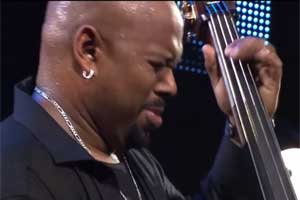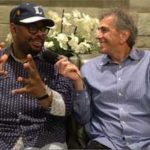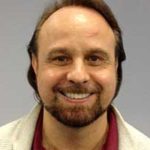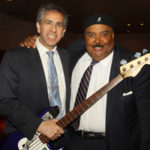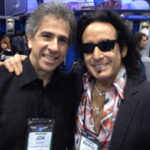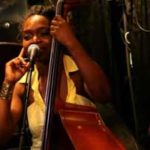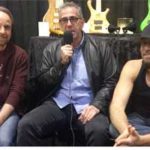The man does it all! Our one-on-one conversation covers Philly, Juilliard, jazz, electric bass, James Brown and more!
Exclusive interview with FBPO’s Jon Liebman
October 24, 2011
Christian McBride is a world-renowned bass player, composer, arranger and educator, whose talents can be heard across practically every musical genre. Christian has played bass for jazz luminaries Bobby Watson, Freddie Hubbard, Sonny Rollins, J.J. Johnson, Ray Brown, Milt Jackson, McCoy Tyner, Roy Haynes, Chick Corea, Herbie Hancock and Pat Metheny. He has also performed and arranged for R&B stars Isaac Hayes, Chaka Khan, Natalie Cole, Lalah Hathaway and only Godfather of Soul himself, James Brown. McBride has collaborated extensively with pop/rock icons Sting, Carly Simon, Don Henley and Bruce Hornsby, hip-hop/neo-soul figures Roots, D’Angelo, and Queen Latifah, opera legend Kathleen Battle, bass virtuoso Edgar Meyer, the Shanghai Quartet and the Sonus Quartet. His latest CDs, The Good Feeling and Conversations with Christian are being released in the fall of 2011 on Mack Avenue Records.
FBPO: What was your musical environment like when you were growing up in Philly?
CM: I had a lot of musicians in the family. Both my father and my great uncle are bass players and my uncle, my mother’s brother, worked for a very popular radio station in Philly. I was always around a lot of great music and a lot of great musicians as a kid, so it just rubbed off on me.
FBPO: How did you become a bass player?
CM: I saw my father playing and I decided that I wanted to do that. My mother bought me my first electric bass when I was 9 years old and I just kind of started from there. I started listening to the radio and listening to my mother’s records and copying what I heard off of those records. When I was 11, I went to a junior high school that had a really great music program. That’s when I started playing the upright bass and having my first private instruction, playing in the school orchestra, learning the fundamentals of music theory and the fundamentals of my instrument and it all kicked off “officially.”
FBPO: You grew up in Philly, which has such a rich musical heritage. In addition to your family and the records that you mentioned, how do you think growing up in that environment influenced you musically?
CM: If you’re around that stuff all the time, it’s really hard to verbalize how that influences you. If you’re around any sort of greatness as a kid, it’s going to rub off on you in some kind of way. I’m sure it’s the same thing for athletes who are young prodigies. They probably are around some great athlete as a kid. That greatness is going to rub off on you at some point. Not only were my father and my great uncle some pretty fantastic musicians, but all the great musicians in the city of Philadelphia rubbed off on me, as well. I think it’s the same thing with other major jazz cities, like Detroit or New Orleans or New York City. If you’re around that type of environment, it’s going to rub off on you.
FBPO: Tell me about taking the plunge in New York. Did you have anything lined up ahead of time, or did you just decide to go for it?
CM: College is what I had lined up in front of me. I moved to New York to go to Juilliard and, as fate would have it, I just started working pretty quickly after I started school. Bobby Watson asked me to join his group, Horizon, and things just kind of snowballed from there, thank goodness! I did one full year at Juilliard, but I had so many opportunities to work and tour and play with all of my heroes, it was getting too difficult to balance both, to play gigs at night and then go to school all day. So, I had a long talk with my mother and my bass instructor and they both understood. They said, “Well, if you’re getting that much work and you feel confident that you can make it just on that, then go for it.”
FBPO: Who was your bass instructor at Juilliard?
CM: His name was Homer Mensch.
FBPO: Oh, sure! He was a big name. What were your musical aspirations while you were at Juilliard? Were you looking to become a symphonic player? I mean, they’re not really known as a jazz school, as far as I know. Are they?
CM: Now they are. They’ve had a jazz program for maybe ten years, but when I was going there, no, they certainly did not have a jazz program. My intention, as naïve as it might have been – I think it was in good faith – I was hoping to have a dual career as a jazz and a classical bassist, but I wasn’t aware that there was no such thing as being a freelance classical musician! I suppose there is, but you definitely have to teach to make some money if you’re not in a symphony orchestra.
FBPO: Can you identify a turning point that made you realize you were going to become a professional musician? Was there a defining moment when the floodgates started to open, or was it more of a gradual thing?
CM: There are two things that probably can be pointed out that felt like turning points for me. One happened before I moved to New York and that was meeting Wynton Marsalis. I met Wynton when I was 14 years old and, at that time, I had been playing the upright bass for maybe three years. I think I’d gotten pretty good at it and I knew I wanted to be a professional musician. I just didn’t know if I was going to be a jazz musician or a classical musician or play in an R&B band or maybe do all three. I didn’t really know what I wanted to do. I just wanted to learn my instrument as best I could so that whatever type of group I played in, I would be prepared. Wynton was the first world-renowned musician I met who really helped me get my focus. He said, “No, you want to be a jazz musician. Look at all this great music you have to learn and all of the great bass players who came before you.” So he really took a hands-on, “Big Brother” approach toward my development. And that, of course, was huge for me to have a mentor like that. This was in early 1987. We know how popular Wynton is now, but even at that time, Wynton was quickly becoming a household name, if he wasn’t already. He was always winning GRAMMY awards, he was always on national television. He was a fast-rising meteor at that time. Now he’s just one of the main stars of the galaxy, but at that time he was still a hot meteor shower. [Laughs]
FBPO: I like those metaphors.
CM: The second thing that happened was when I moved to New York and I started playing in Jesse Davis’ group. Jesse Davis is a wonderful alto saxophonist and we were the house band at a club called Augie’s, which is now known as Smoke. At Augie’s, I just met so many musicians. Every musician in New York would go there to jam. I didn’t meet too many famous musicians, but I just met all of the other young cats who were in New York trying to make it, as well. I got to meet guys like Eric McPherson, Abraham Burden, Spike Wilner, Avishai Cohen – the bass player, not the trumpet player. And that was just a real, true New York experience. We would have to pass the hat. That’s how we got paid, you know. We got paid by tips. I would have to walk around the club with the little basket and ask for tips. And it was fun!
FBPO: It’s fun when you’re young, I suppose.
CM: Exactly! The lean years.
FBPO: It seems for years you were known as the young, hotshot bass player in the straight-ahead jazz world. In fact, when I saw you with Chick Corea and John McLaughlin a few years ago, I was actually surprised to see you with an electric bass. Are you as passionate about the electric as you are about the upright?
CM: I’m sometimes shocked at the so-called “openness” of the jazz world. We talk about influences from all of these different cultures kind of knowing what’s going on in the jazz world because there’s a significant chunk of recordings that I’ve played on where I’ve played electric bass that somehow went completely by everyone’s head in the jazz world. Even now, people still say, “I didn’t know you played electric bass!” Well, electric bass is actually my first instrument. Even before the five-piece band tour, there was my album Live at Tonic, there was my album A Family Affair and Vertical Vision, where I played a pretty good amount of electric bass. And the recordings I made with George Duke and David Sanborn and Al Jarreau, where I played a significant amount of electric bass. I don’t play more electric bass than acoustic bass, but certainly enough electric bass where one would think they wouldn’t be surprised by that now. I just think it’s a sub-conscious choice that most jazz fans make, where they actually hope one does not play the electric bass, so when they see it, they just go, “Oh, yeah. Right. I didn’t notice that.” [Laughs].
But yes, I’m quite as passionate about the electric bass as I am the acoustic bass. I’m passionate about expression. That’s what I’m passionate about. So, whatever instrument is the right instrument for that particular style of music, that’s what I’ll do. Through most of my career, the acoustic bass has been my primary choice for expression. There is a certain sense of what I call the “Mother Earth” factor with the acoustic bass. I mean it is the true sound and feel of the bottom. I most certainly enjoy playing the acoustic bass. I won’t say I enjoy it more because that would be controversial and misconstrued. As I said, my passion is for expression. If somebody needs me to play the electric bass, without a shadow of a doubt, I’ll do it. Maceo Parker or whoever it might be that likes the electric bass more. Whatever the music calls for, that’s the instrument that I’ll play.
FBPO: It’s funny how people can get typecast. I had a similar conversation with John Patitucci. He said some of the film guys would say, “Oh, you play electric, too?”
CM: It’s funny you would mention that because when John first moved [back] to New York City, he was trying desperately, I mean desperately to shed his reputation as being this hot electric bass player.
FBPO: Right!
CM: Because most people only knew him through the Chick Corea Elektric Band. And when he got to New York and he flatly wouldn’t take gigs on electric bass. And I think it’s worked pretty well for him.
FBPO: Switching gears for a minute here, tell me something about James Brown that most people don’t know.
CM: Hmm. I don’t know if most people don’t know this, but at his musical core, he was a jazz musician. Most of James Brown’s music is improvisational. Most of the forms can change at the drop of a hat. You really do have to have a sense of “anything can change at any second now” when you play with James Brown. That’s why you always had to watch him. Sometimes he would change the tempo in the middle of the song. He would go from one song to another and not really have much time to prepare for it. He would rarely go, “One – Two, One – Two – Three – Four.” And once you were already inside the song, he would vamp for a long time and he would just kind of make up things right there on the spot. He was very jazz-like in his approach. And it made sense that when you talked to him and asked him who his favorite musicians were, he would always name Louie Jordan and Roy Brown, the great blues singer. But then he’d mention all the rest. He would say, “I love Count Basie, I love Horace Silver, I love John Coltrane, I love Jimmy Smith.” He would start naming all these jazz musicians! We really paid close attention to the way he performed and his creative energy. It was very jazzy. It was very improvisational.
FBPO: What was your role with him? Were you playing bass or were you collaborating in some other capacity?
CM: Both. I produced one of his final shows at the Hollywood Bowl in 2006. It was a jazz concert and I had Mr. Brown with a big band, performing all of the jazz standards from his album called Soul on Top. Sadly, it’s an album of Mr. Brown’s that’s not very well known. It’s with Louie Bellson’s big band with all the arrangements done by Oliver Nelson. Ray Brown is playing bass on it, Ernie Watts is on it, Pete Christlieb and all of the heavyweight LA jazz guys are on the album. It’s an album that Mr. Brown put out at the peak of his career, in the late ’60s, and it just kind of slipped under the radar screen. So, me being the James Brown fanatic as I am, when I had an opportunity to work with him, I asked him would he be interested in doing a jazz project, and he was so excited! He just couldn’t wait to do something like that.
FBPO: Christian, can you comment on what happens when bass players get together to perform with other bass players? I was privileged to see you perform with John Clayton and Rodney Whitaker at the Detroit Jazz Fest a couple years ago, which I really enjoyed. I’ve also seen Jeff Berlin with Stu Hamm and Billy Sheehan and I’ve seen Stanley Clarke with Marcus Miller and Victor Wooten. In fact, you had a tune on your first album, “Splanky,” with Ray Brown and Milt Hinton. Is this the sign of a trend among bass players, do you think?
CM: Well, as Ray Brown would always say when he did interviews about Superbass twenty years ago, his response would usually be, “How come people think bass players don’t play together?” He said, “Just because we don’t make records together don’t mean we don’t play together!” Every time you see two or three trumpet players on stage together or two or three saxophone players on stage, people think that’s somehow the norm. How come people think bass players don’t jam backstage at a jazz festival? It happens all the time! And the same thing happens with bass players as it does with trumpet players. We listen, we react, we play and that’s it! [Laughs]
FBPO: Tell me about your new releases.
CM: The first one, which is my big band CD, came out two weeks ago and my CD of duets hits on November the 8th. My big band CD is called The Good Feeling and the one that’s coming out in November is Conversations with Christian.
FBPO: Who’s on those records?
CM: The big band CD has some of my favorite musicians in the world, mostly New York-based, with the exception of Nicholas Payton. Nicholas Payton plays all of the trumpet solos on the CD. Some of the other soloists include Steve Wilson, Ron Blake, Steve Davis on trombone, Michael Dease on trombone, my wife Melissa Walker sang on a couple tracks, Xavier Davis plays piano, Ulysses Owens plays drums and a slew of other great guys who came and played.
FBPO: How about on the duets record?
CM: On the duets record, there’s Angelique Kidjo, Sting, Dee Dee Bridgewater, Dr. Billy Taylor, Hank Jones, Eddie Palmieri, Chick Corea, George Duke, Regina Carter, Roy Hargrove, Russell Malone, Ron Blake and Gina Gershon. I hope I didn’t miss anybody!
FBPO: Did you put some kind of special tribute to Dr. Billy Taylor and Hank Jones, given that they have now departed?
CM: Sure! I think what’s more important is that I got to record with these gentlemen just before they passed away. I hope people listen to this recording and appreciate how great they were so close to their transitions.
FBPO: What else is keeping you busy these days? Are you still doing the Sirius/XM thing?
CM: Sort of. I have a bunch of shows in the can. I’m waiting to put together an entire season before I can sign on the air with Season Two. It’s been difficult because my calendar’s been pretty full with a lot of touring with my group, Inside Straight, and a whole lot of different things, thank goodness.
FBPO: What else lies ahead for your career? What else can we look forward to seeing and hearing from Christian McBride?
CM: Stay tuned. It could be anything! [Laughs]
FBPO: Is there anything you’ve always wanted to accomplish but just haven’t gotten around to doing yet?
CM: Yes, there’s a whole lot of different things I would love to do, but part of me feels so fortunate that a lot of things that have been on my wish list have happened already. It’s funny. When I worked with James Brown, I was totally prepared for major depression after that concert was over because I kept thinking, “What now? I’ve worked with my childhood hero and it’s all downhill after this!” [Laughs] Fortunately, that was hardly the case.
I had a chance to do my first big band recording. I’m very happy, but I still have a wish list of a lot more things to do and I just want to work with the best musicians possible. There are a lot of genius musicians out there and if I can just stay around them and keep having these different experiences, I’ll be happy. And I don’t just mean jazz musicians, either.
FBPO: Last question: What would you be if you weren’t a bass player?
CM: I wanted to be a pro football player. I still dream about that every now and then. Funny, if I were a pro football player, my career probably would have long been over by now.
